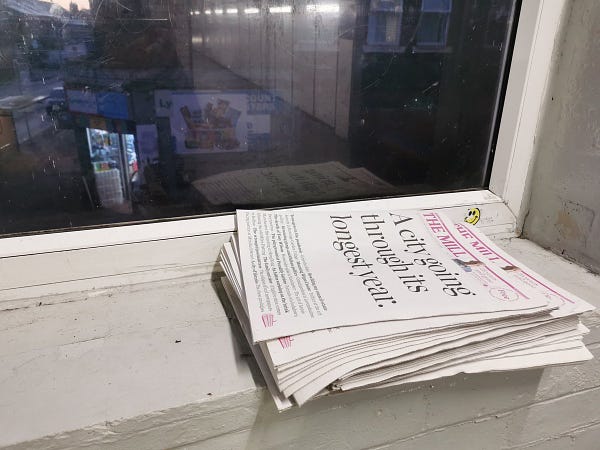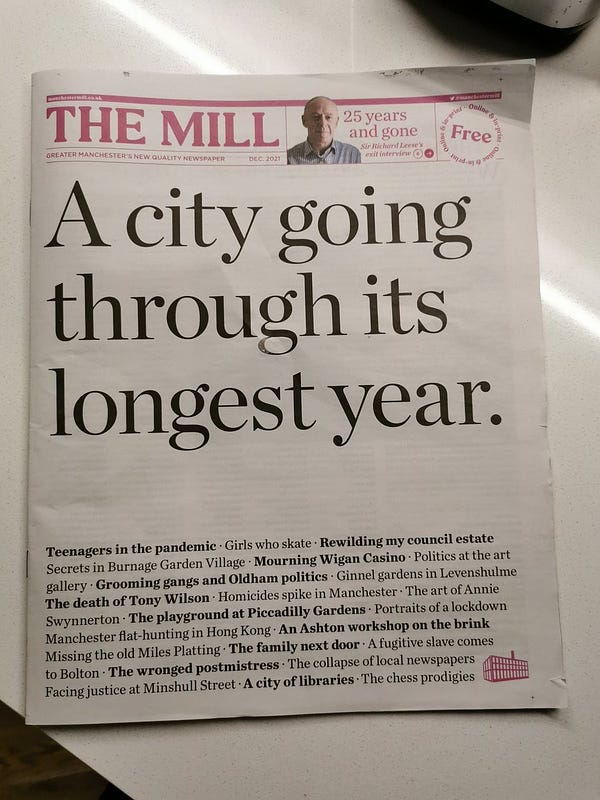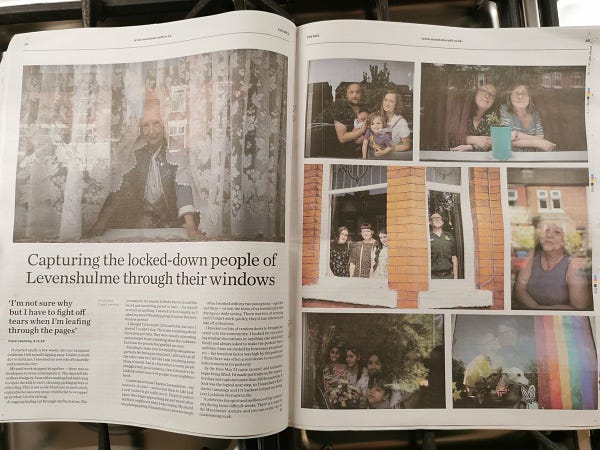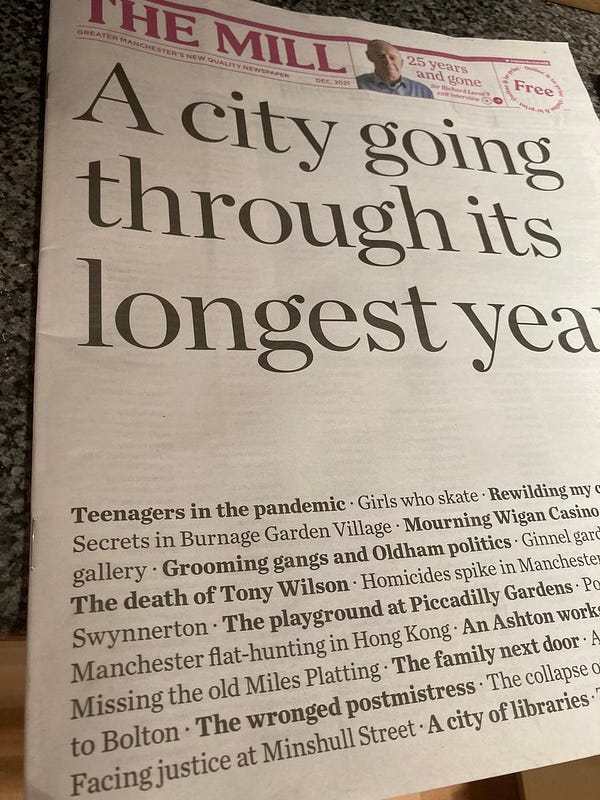Record new cases in Greater Manchester as Omicron spreads
Plus the rest of your weekly briefing
Dear Millers — welcome to this week’s briefing, which takes a look at the latest Covid-19 numbers in Greater Manchester and also recommends some things you can do from home this week.
This will be the last briefing for a couple of weeks — the Mill team is scheduling a few stories for the festive break but otherwise taking some time off. This has been an unbelievable year for us — our first full year publishing — and we hope to come back refreshed and ready to grow again in 2022.
We got a huge response to our profile of Sir Richard Leese this weekend — thanks for your many tweets.


🎄 Struggling for a last-minute present? Give a gift that requires no in-person shopping, emits no carbon and supports the renaissance of high-quality journalism in the North of England! Click below to buy a friend a Gift Membership to The Mill, and we will give you a second gift membership free. Once you’ve made your purchase, just email editor@manchestermill.co.uk with the email address for the second recipient, and we will put them on the members list.
A quick thank you to the members who have helped us with our print edition. The biggest thank you goes to Richard Heap, who designed the edition in his spare time over the past few months and managed to make something really beautiful. We’re also very grateful to the dozens of members who have distributed copies to friends and at local cafes, markets and galleries.




This week’s weather ⛅️
Our forecast comes from local weatherman Martin Miles, who says: “As Christmas moves ever closer, our weather will undergo some changes, which are proving complicated to nail down. Before that, the next few days will be cold and settled.”
Monday ⛅️ Chilly with hazy sunny spells away from areas stuck under fog/low cloud. Murky overnight into Tuesday. Max 6°c.
Tuesday ⛅️ Dry with hazy spells of sunshine for daytime. A widespread frost will follow overnight, with a risk of freezing fog patches. Max 5°c.
Wednesday ⛅️ Cold and frosty with patchy freezing fog early on. Skies should soon brighten to allow for plenty of winter sunshine. Rain preceded by hill snow will move in overnight. Max 3°c.
Thursday 🌧 Cold and damp with spells of rain. At the moment, the air looks set to be too mild for snow away from the hills. Max 7°c.
Friday 🌦 Chilly with showers or longer spells of rain. Max 7°c.
Christmas 🎄 High uncertainty, but the potential is there for wintry weather.
For the full forecast, visit Manchester Weather. Updates are posted daily at 6.15am.


The big story: Covid-19 case rates are now shooting up
Top line: Covid-19 case rates have been very stable in Greater Manchester since August — now they are shooting up fast. As you can see in our dashboard below (which goes up to last Thursday because data for more recent days is incomplete) we’re now seeing days with more positive tests than at any point since mass testing began.
The numbers: The latest GM case rate is now 720.3, up 60.6% on the previous week, and it’s clearly going to rise much higher in the days ahead. Look at those pink bars on the very right-hand side of the dashboard showing massive sets of new positives on Tuesday, Wednesday and Thursday last week. The rate across England is a bit higher, at 782.5, up just under 50% in a week.
Zoom in: New cases are highest in Trafford at the moment and lowest in Bolton. Rates in Trafford are highest among 5-14-year-olds, although they are also very high for all age groups up to 50. You see a very similar picture when you look at Bury, which has the second-highest rates in GM — cases have been extremely high among children and teenagers for a month, and have recently risen among people in their 30s and 40s. As always, levels of testing are a factor in case rates.
What about hospitals? The big question is how these higher rates, which are driven by the Omicron variant (plus the fact that the Omicron variant means many more people are taking tests) are going to translate into hospital admissions. Given how recently rates started rising, it’s probably too early to answer that question. So far, we haven’t seen any significant increase in Covid-19 hospital admissions in the north west, as you can see on the government’s dashboard.
How bad is Omicron? Clearly, it is very transmissible — the data from South Africa and the early data in this country show that. But there’s still a lot of uncertainty about the severity of the new variant — i.e. what proportion of people who get it will end up being very sick.
Research done by Prof Ravi Gupta at Cambridge University suggests Omicron “may be less effective at attacking the lungs than Delta,” reports the Guardian, adding: “The finding chimes with University of Hong Kong research that found Omicron replicated 70 times faster than older variants in the bronchial tubes, but is less likely to infect the lungs.”
In a fascinating interview, Francois Balloux from UCL told New York magazine: “It’s a really major question. And sadly, I don’t think we can extrapolate anything from South Africa, really. We don’t actually even know the vaccine status of the hospitalized… I think in the U.K. in two weeks’ time we’d be pretty comfortable saying, these are the numbers and these are the patterns.”
Andy Burnham isn’t currently calling for a lockdown. He told the BBC over the weekend:
If I look at the Greater Manchester figures right now, I don’t see a justication for any form of lockdown. There is a small rise in the numbers of cases but the position in hospitals isn’t really changing. Maybe slightly increasing upwards but not hugely.
Looking forward: After a cabinet meeting today, The Times reports that “Boris Johnson is unlikely to impose further coronavirus restrictions before Christmas after delaying a decision today”. The paper’s political editor tweeted this afternoon: “The more likely scenario — as disclosed by The Times at the weekend — is a two-week circuit breaker after Christmas. The 28th has been pencilled in by officials as the starting point for the new curbs”.
Andy Burnham will be presenting new hospital and vaccination data at a press conference tomorrow. We’ll analyse that in our members’ newsletter on Wednesday morning.
Home of the week
This charming cottage in Leigh has exposed ceiling beams and a sizeable garden. It’s on the market for £190,000.
Other local news in brief
Greater Manchester’s roads saw a spate of deaths over the weekend. Five people died, including a woman who was hit by a tram in Tameside, and a 10-year-old girl who was hit by a car in Oldham. Police watchdog the Independent Office for Police Conduct confirmed it was looking into GMP's response after a man’s body was found on the M67 after being reportedly hit by a GMP vehicle. Read more.
The consultation for the Levenshulme and Burnage Active Travel Neighbourhood scheme went live on Friday, with plans to expand the low traffic areas. Some of the traffic calming measures installed last year — such as planters placed at junctions — have proven divisive. You can read our piece from earlier this year about low-traffic neighbourhoods here.
Michael Gove’s comments in a recent Spectator article about levelling up have been welcomed by the Northern Powerhouse Partnership. Its director Henri Murison said: “Gove’s analysis bears a striking resemblance to George Osborne’s original northern powerhouse vision: investment in arts and innovation, strong cities enabling growth across their surrounding towns, with powerful local leadership to tie it all together.” Read more.
Photo of the week
Dani took this lovely photo of St Mary’s Church in Hulme looming out of the fog this weekend. Follow Dani on Twitter for more of her Mill photography.
Our favourite reads
The Fearless Mother-Daughter Duo Who Tamed Lions to Save the Circus — Narratively
In 1957, Salford was descended upon by circus folk from around the country after Elizabeth Kayes — long known across Britain as “Mammie,” the 79-year-old proprietor of Buff Bill’s Circus — died. “According to The Salford Reporter, they all knew Mammie as ‘one of the finest characters in circus life,’ and many may have whispered to each other of her exploits as they lowered her into the ground beside her husband at Weaste Cemetery.”
Second half rules — Big Issue North
Longtime Miller Michael Taylor has an interesting interview with Gary Neville in the latest edition of Big Issue North. At one point, Neville tells Taylor about his encounter with a group of rough sleepers who were using the former Stock Exchange building he was turning into a hotel. “I’ve always talked to all sorts of homeless people on the streets in Manchester, and when they moved into that building I said there are two conditions – don’t wreck the building and don’t do anything illegal in there. In return, we’ll monitor it, we’ll provide security, we’ll put in heating, plumbing and showers. But we’ll need it back in April.”
Would You Pay $2.5 Million for That Painting? — Texas Monthly
This fascinating piece of journalism from across the pond tells the story of a painting that was found in Manchester in the 1980s and went on to sell for a staggering $2.5 million. Mair Baulch, who ran a home for delinquent boys, found the painting and thought it might fetch a modest £20,000. “Five feet high and nine feet long, it was a spectacular, almost supernatural landscape, a sprawling vista of towering, eerily lighted icebergs lurking above the battered flotsam of a sailing ship.”
The secret negotiations to restore Manchester to greatness — The Guardian
After our long-read about Sir Richard Leese over the weekend, you might want to read about the man who worked alongside him for many years as the council’s chief executive: Sir Howard Bernstein. The piece, by Simon Jenkins, focuses on the deal-making between Bernstein and George Osborne to devolve new powers to Greater Manchester. “The Osborne-Bernstein deal was like two mafia bosses carving up Apulia,” Jenkins writes. “There was no white paper or consultative document, let alone a debate in parliament. Manchester’s deal with Osborne was reached by sleight of hand, by one man with a political problem to solve and another who saw this as an opportunity.”
Our to do list
📺 Watch | The refurbishment of Manchester Town Hall, considered a Victorian neo-gothic masterpiece, will be featured on Great British Landmark Fixers on the Yesterday Channel this evening at 8pm.
🐛 Exhibition | Manchester Museum has a pretty cool online exhibition that lets you get up close and personal with the world of insects. Love them or hate them, “a world without insects would, in the end, be a world without people,” the museum says. More here.
📚 Books | Elizabeth Gaskell’s online reading group has wrapped up for the year, but if you have time over the festive break to cram in 12 books, take a look at their reading list. More here.
🎧 Podcast | Listen to our editor Joshi explain the process of writing about the life and career of Sir Richard Leese in our latest podcast episode, which also features a great segment about a pioneering gardening project in Salford. Available on Apple or Spotify.
🧘♂️ Meditation | There's a guided online meditation session on Boxing Day. It's free and uses gentle Sahaja Yoga techniques to aid mindfulness and relax the body. Book here.
🎨 Art | There'll be an online life drawing class by Life Drawing Manchester this Wednesday. This week's subject is a contortionist, who will be doing some “expressive gestural poses." Book here.
✍ Writing | Manchester Writing Circle meets online every week. It’s a group for budding writers, poets, and screenwriters. You can get feedback on your work, take part in workshops and listen to inspiring speakers. More here.
Book of the week: Home by Nick Hedges
These evocative and gritty photographs by documentary photographer Nick Hedges tell the story of the slum housing crisis in 1960s and 1970s Britain. His photos for the charity Shelter were instrumental in changing attitudes towards the housing crisis. Here’s a bit more context about the issue:
Generations of children grew up in the environment of desolation, decay, and demolition. Hedges’ photographs from Birmingham, Manchester, Glasgow and Newcastle illustrate the playing fields of the cities. The strong working class community cultures were being broken down, as regular employment became less certain, families became dispersed, and old certainties vanished.
Home is available to buy here.








